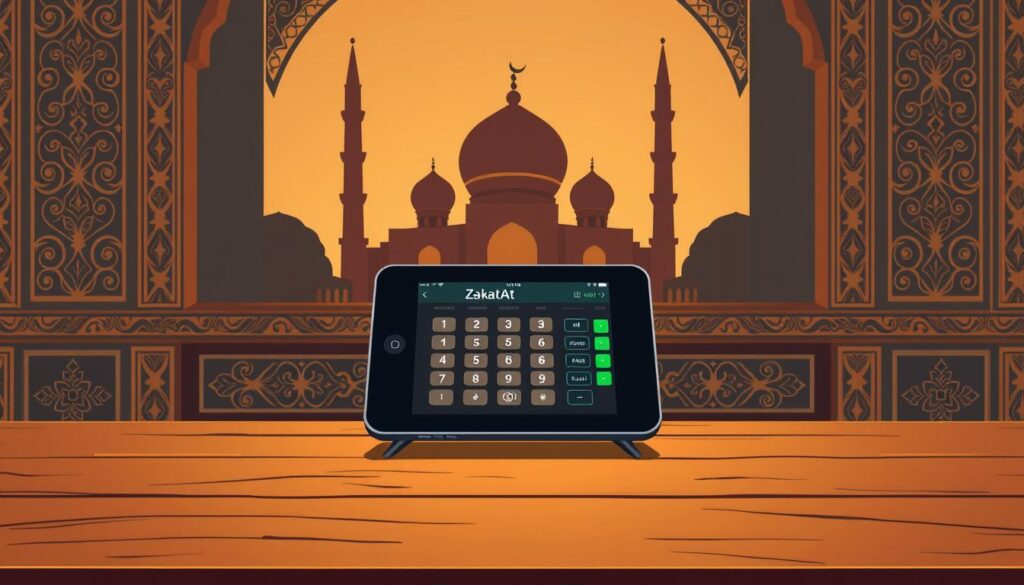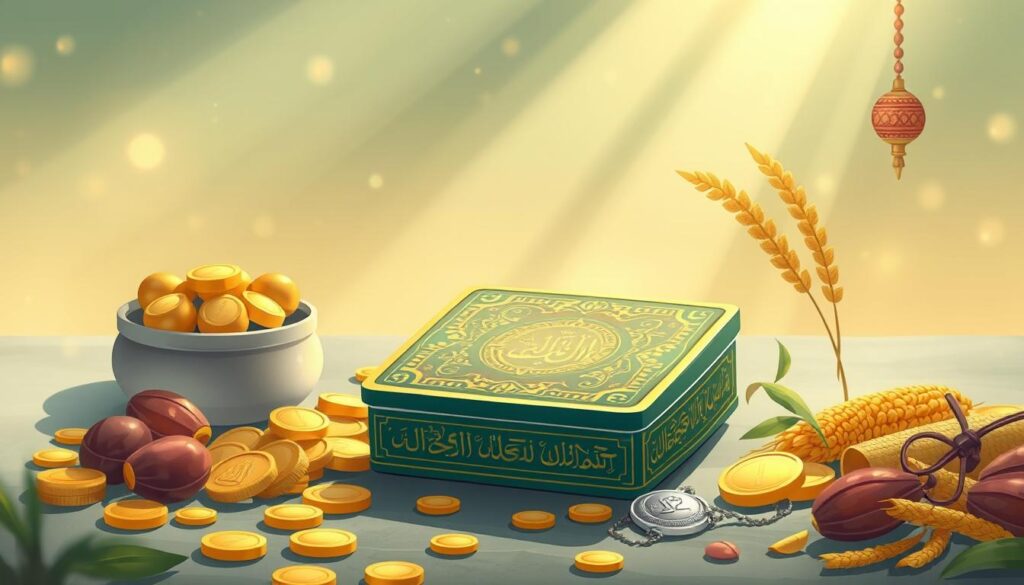Did you know Zakat is mentioned over 30 times in the Quran? It’s often linked with prayer. As Muslims, we must understand and fulfill this third pillar of Islam. Calculating Zakat on wealth is a spiritual duty, aiming to purify our wealth and souls.
We’ll explore Zakat’s principles and practices. You’ll learn how to calculate and distribute your Zakat correctly. This guide ensures you understand the Zakat formula well.
We’ll discuss Zakat calculation basics, like the Nisab threshold and calculation methods. We’ll also talk about the importance of intent in Zakat. Zakat organizations play a key role in distributing funds to those in need.
By following this guide, you’ll know how to accurately calculate your Zakat. Your generosity can make a big difference in your community. We invite you to support our cause through volunteering, sharing our mission, or donating online to Umar Khan Charity Organization.
We’re committed to helping you fulfill your Zakat obligations. Online Zakat calculators and the Zakat Guide Booklet are available to help. During Ramadan, Islamic Relief’s Zakat Hotline offers extra help with Zakat calculations.
Key Takeaways
- Calculating Zakat on wealth is a spiritual obligation that aims to purify our wealth and souls.
- Zakat is calculated as 2.5% of surplus wealth, using the Zakat formula.
- The Nisab threshold for Zakat eligibility is set at the value of 3 ounces of gold or 21 ounces of silver.
- Zakat organizations play a crucial role in distributing funds to those in need.
- Intent and sincerity are essential when giving Zakat.
- There are various resources available to help with Zakat calculation, including online Zakat calculators and the Zakat Guide Booklet.
- We invite you to support our cause and make a meaningful impact in your community.
What is Zakat?
Zakat is a key part of Islam, focusing on helping those in need. It cleanses one’s wealth and soul, as the Quran teaches. Knowing about Zakat helps Muslims meet their duties and help society.
Exploring Zakat shows its role in building communities. The Zakat calculation guide and Zakat calculator help Muslims figure out their duties. These tools ensure they give what is required by Islamic law.
Zakat’s history is important too. It has helped Islamic communities feel connected and cared for. We can use these lessons to improve our giving and charity today.
Some important Zakat facts are:
- Zakat rate: 2.5% of personal and business wealth
- Nisab threshold: 85 grams of pure gold
- Types of wealth subject to Zakat: gold, silver, cash, stocks, business stock, livestock, pensions, and property
By understanding and applying Zakat, we can build a fairer and kinder world. This reflects the values of Islamic finance and generosity.
Types of Wealth Subject to Zakat
Calculating Zakat on wealth can seem complex. But knowing what wealth is subject to Zakat is key. Islamic law says Zakat is owed on certain assets like cash, gold, silver, and more.
When figuring out Zakat, we must look at the assets we own. Cash, whether in our hands or in banks, is subject to Zakat. Investments and real estate, if for profit, also fall under Zakat.
Cash and Salable Assets
Cash and items like gold and silver must pay Zakat. The Zakat rate for these is 2.5%. But, we must figure out the weight and purity of gold and silver to calculate it.
- Cash in hand or in bank accounts
- Gold and silver, including jewelry and coins
- Investments, such as stocks and shares
- Real estate, if held for investment purposes
Investments and Real Estate
Calculating Zakat on investments and real estate can be tricky. Their values can change. But, by understanding Zakat, we can meet our duties. To calculate Zakat, we add up our assets, subtract debts, and apply the Zakat rate.
Determining the Nisab Threshold
Calculating the Nisab threshold is key to figuring out if you need to pay Zakat. The Nisab is the minimum wealth needed to pay Zakat, based on gold or silver values. It’s about 87.49 grams of gold or 613.35 grams of silver. Right now, the Nisab is around $4,181.15, based on gold’s price per gram.
The Zakat calculation is vital for our Islamic duties. We must get our Zakat right to fulfill our duties. Zakat is 2.5% of our assets like cash, savings, and investments.
Here are important points for the Nisab threshold:
- The Nisab threshold is met when personal wealth and business wealth separately reach the threshold or can be combined to meet the threshold for Zakat payment.
- Necessary debt payments can be deducted from the total due Zakat amount before payment.
- Zakat is calculated at a standard rate of 2.5% of Zakatable assets.
By knowing the Nisab threshold and the Zakat calculation process, we can meet our Islamic duties. The Islamic wealth tax is a big part of our faith. We must handle it with care and detail.
Zakat Calculation Methods
Understanding how to calculate Zakat is key to doing it right. We think a simple Zakat calculation guide makes it easy for everyone. First, you figure out the total value of your Zakatable assets. Then, you subtract any debts you owe.
What’s left is taxed at 2.5%. A Zakat calculator can really help with this. It’s important to count all your assets, like money, investments, and goods you’re selling.
Here are some important things to remember when calculating Zakat:
- Cash and things like it are taxed at 2.5%.
- Investments, like stocks and bonds, are also taxed.
- Goods you’re selling, like what you have in stock, are taxed at 2.5%.
By following these steps and using a Zakat calculator, you can make sure you’re doing your Zakat right. Remember, Calculating Zakat on Wealth is a big part of Islamic finance. We’re here to help make it easier for you.

The Annual Cycle of Zakat
Paying Zakat on time is crucial for following Islamic rules. Zakat is owed after one lunar year since your wealth hit the Nisab level. It’s key to know when your Zakat year begins and ends for timely payment.
The Zakat cycle follows the lunar calendar. To figure out Zakat on money, we must consider the Islamic wealth tax and how to calculate it. Here are some important points:
- Zakat is owed after 12 full lunar months since you fully owned the wealth.
- The end of a complete 12 months in the hijri calendar is the Zakat deadline, a strict one.
- Changes in wealth below Nisab reset the Zakat year count for three Islamic schools.
Knowing when and how to pay Zakat helps us follow the rules and help our community.
| Category | Nisab | Zakat Rate |
|---|---|---|
| Personal Wealth | 3 US OZ (PURE GOLD) | 2.5% |
| Business Wealth | 3 US OZ (PURE GOLD) | 2.5% CURRENT WHOLESALE |
Let’s all work together to help our community by paying Zakat on time and supporting those in need.
Common Mistakes in Zakat Calculation
We all want to give generously, but mistakes can happen in Zakat calculations. It’s key to know the common errors to avoid them. Using a Zakat calculator or guide can make the process easier and reduce mistakes.
Some common mistakes include:
- Overlooking certain assets, such as cash, gold, or silver
- Miscalculating the Nisab threshold, which is about $5,000 for gold and $400 for silver
- Not considering all Zakatable liabilities, such as outstanding debts
Knowing these mistakes helps us make sure our Zakat is correct and follows Islamic law. For more on Zakat and how to calculate it, check out Umar Khan Charity.
Getting Zakat right is important. It ensures we give the right amount and avoid issues next year. A Zakat calculator or guide helps simplify the process and maximizes our charitable impact.
The Role of Intent in Zakat
Exploring Zakat shows us that our intention matters as much as the act itself. Zakat, or the Islamic wealth tax, is more than just money. It’s a spiritual act that needs a true intention to please Allah. When we calculate Zakat, we must keep our intention pure and sincere.
The Quran and Hadith stress the importance of sincerity in all worship, including Zakat. As we figure out Zakat, remember that our intention is key. A correct intention, or Niyyah, makes our actions more than just charity. It turns them into acts of worship.
Here are some key points about the intention behind Zakat:
- Understanding Zakat’s purpose and its role in our spiritual lives
- Seeing the value of sincerity and genuine intention in all worship
- Making sure our intention is pure and focused on pleasing Allah, not seeking praise or reward
By focusing on our intention, Zakat becomes more than just a financial act. It becomes a spiritual reward. As we work on perfecting our Zakat and fulfilling our Islamic wealth tax duties, let’s remember the importance of a sincere intention.
Zakat Distribution Guidelines
When we pay Zakat, it’s key to know how to give it to those in need. We aim to help our community by following these rules. A Zakat calculator helps figure out how much to give.
Islamic law says Zakat should go to eight groups. These include the poor, needy, and those in debt. A Zakat calculator makes it easier to give the right amount. It helps us follow the Zakat calculation guide.
Some examples of who can get Zakat include:
- The poor and needy
- Those in debt
- Travelers who are stranded
- Those who are fighting for a just cause
By following these guidelines and using tools like Zakat calculators, we make our Zakat pleasing to Allah. It also helps those in need. We use Zakat calculation guides to make sure we give the right amount.
| Category | Description |
|---|---|
| Poor and needy | Those who are unable to meet their basic needs |
| Those in debt | Individuals who are struggling to pay off their debts |
| Travelers who are stranded | People who are traveling and have become stranded due to unforeseen circumstances |
Zakat versus Other Forms of Charity
It’s important for Muslims to know the difference between Zakat and other charities. Zakat is a required act of giving, while Sadaqah is optional. Zakat is a tax on certain wealth like gold, silver, crops, and animals.
To figure out How to calculate Zakat on wealth, remember it’s for the poor and needy only. Sadaqah, however, can go to anyone in need, including family and non-believers. Zakat is 2.5% of your wealth, but Sadaqah can be any amount anytime.
The main differences are:
- Zakat is required, Sadaqah is not
- Zakat goes to specific people, Sadaqah to anyone
- Zakat has a fixed rate, Sadaqah varies
Knowing these differences helps Muslims give effectively. Zakat and Sadaqah help our community and show our kindness and generosity.
The Spiritual Benefits of Paying Zakat
We see Zakat as more than just a financial duty. It’s a way to purify our souls and grow our faith. When we use a Zakat guide or calculator, we remember the value of giving and its effect on our community.
The Zakat formula is straightforward: 2.5% of our wealth after a year. Yet, Zakat’s benefits extend beyond money. It builds community and teaches us to care for others. Using a Zakat calculator helps us understand the importance of giving with true heart.
Some key spiritual benefits of Zakat are:
- Strengthening our faith and connection with Allah
- Purifying our souls and wealth
- Fostering a sense of community and social responsibility
- Addressing economic disparities and promoting social justice
By paying Zakat, we do more than follow a rule. We help the world. We urge all Muslims to find out their Zakat using a guide or calculator. Let’s give with sincerity and purpose.

Local Zakat Initiatives: Umar Khan Charity Organization
We support local Zakat initiatives that show Islamic kindness and help our communities. The Umar Khan Charity Organization is one such group. They work to improve lives through faith-based help. Their goals match our values of helping and sharing.
When we figure out our Wealth Zakat calculation, we think about how our donations help. Supporting groups like Umar Khan Charity ensures our Zakat helps those in need. The Zakat calculation is complex, but knowing about Islamic wealth tax helps us give wisely.
Some important things about the Umar Khan Charity Organization are:
- Dedication to sustainable, faith-based humanitarian work
- Focus on transforming lives and making a positive impact in the community
- Alignment with Islamic principles and values
By joining local Zakat efforts like Umar Khan Charity, we spread kindness. Together, we can make our communities better. We aim to build a society that values compassion and kindness, just like Islam teaches.
How to Get Involved with Zakat
Paying Zakat is more than a religious duty. It’s a chance to truly help others. You can volunteer or donate to support those in need.
Volunteer Opportunities
Work with groups like Umar Khan Charity to help give out Zakat. Your skills and time can make a big difference in people’s lives.
Diverse Donation Options
You can also donate one-time or regularly to charities. Online Zakat calculators and guides help you figure out how much to give. This way, you can make a lasting change.






